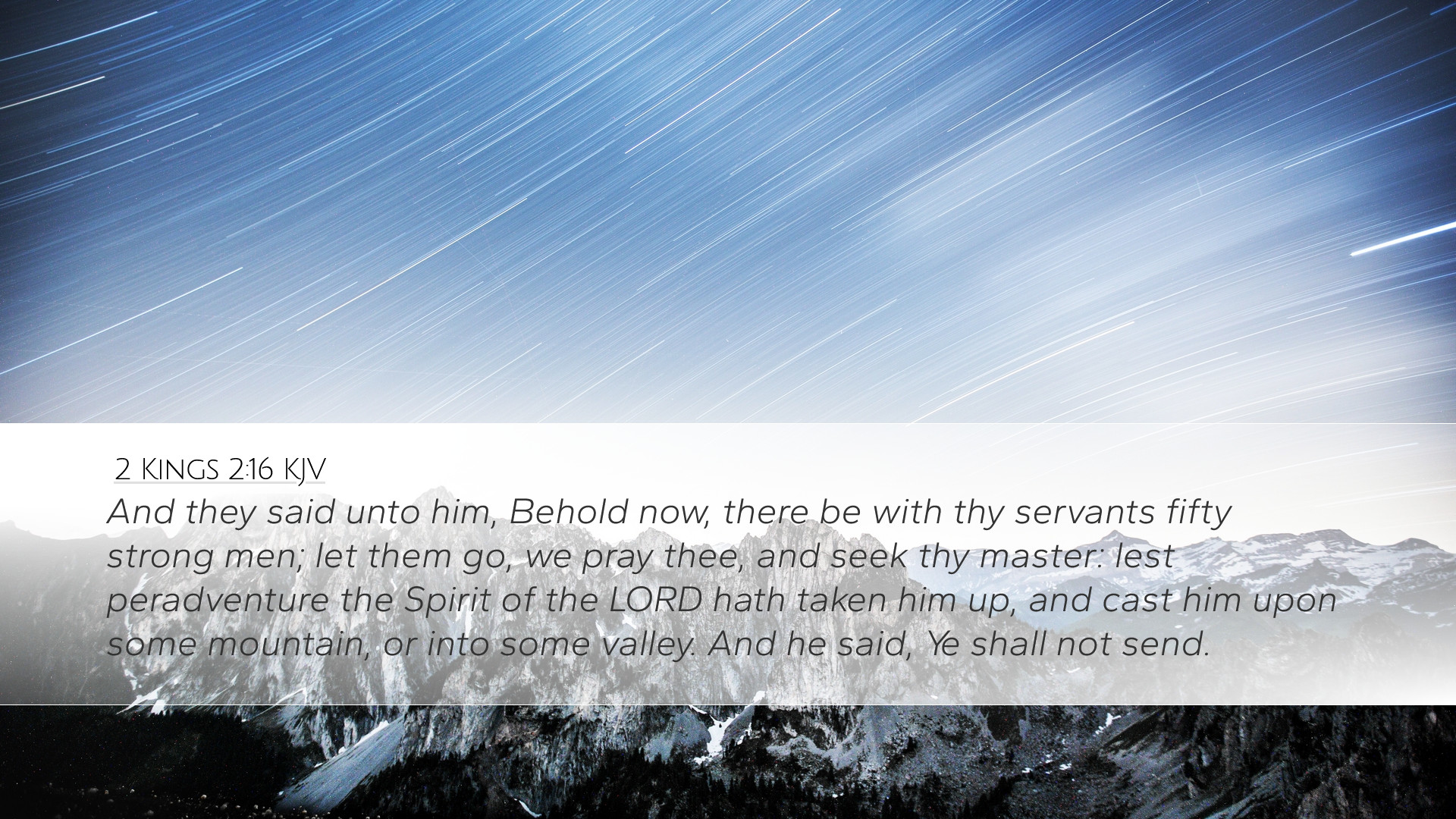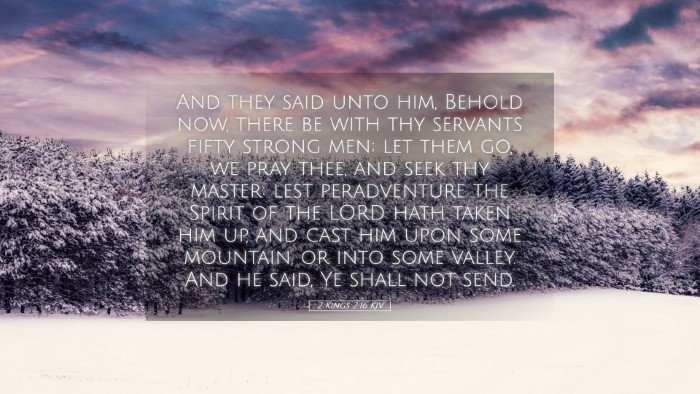Commentary on 2 Kings 2:16
Bible Verse: "And they said unto him, Behold now, there be with thy servants fifty strong men; let them go, we pray thee, and seek thy master: lest peradventure the Spirit of the Lord hath taken him up, and cast him upon some mountain, or into some valley. And he said, Ye shall not send." (2 Kings 2:16 KJV)
Introduction
This verse encapsulates a moment of uncertainty among the prophets who were witnessing the ascension of Elijah. Their suggestion to send searchers reflects a deep concern for Elijah’s fate, illustrating themes of prophetic ministry, the invisible workings of God’s Spirit, and the human tendency to cling to the familiar.
Context and Background
The context of this verse follows the dramatic event of Elijah's ascension. He had been a significant prophetic voice throughout Israel, confronting kings and false prophets. His departure marks a critical transition in Israel’s spiritual leadership. This moment is vital not only for Elisha who is to succeed Elijah but also for the remaining prophets who were entrenched in the ongoing spiritual battle against idolatry in Israel.
Critical Insights from Public Domain Commentaries
Matthew Henry’s Commentary
Matthew Henry reflects on the prophets’ reaction to Elijah’s disappearance. He highlights how the prophets felt the absence of Elijah profoundly, viewing him as an indispensable leader. Henry points out that the suggestion to search for Elijah, perhaps in the mountains or valleys, indicates their skepticism regarding the nature of his departure, expressing their struggle to understand the intangible workings of the Spirit of God.
- Concern for Elijah: Henry notes that their desire to search for Elijah stems from a genuine concern rather than doubt in God’s power. They feared that the Spirit might have placed him somewhere unknown.
- Human Nature: Henry argues that this reflects human nature’s inclination towards material signs and familiarity. Even in spiritual leadership, there’s a tendency to want tangible confirmation of God’s workings.
Albert Barnes’ Notes on the Bible
Albert Barnes elaborates on the practical implications of this verse, particularly regarding the prophets' request to search for Elijah. He emphasizes the following points:
- Understanding the Divine: Barnes suggests that this instance reveals an essential truth about the divine—God’s ways are often beyond human understanding. The prophets’ suggestion portrays their wrestling with a mystery they could not fully comprehend.
- Faith vs. Fear: The fear that Elijah might be lost leads to this proposal. Barnes notes that faith should have led them to trust in God's plan, rather than resorting to human efforts to find Elijah.
Adam Clarke’s Commentary
Adam Clarke offers a detailed analysis of the social and theological implications of this verse. He notes that:
- Prophetic Community: Clarke emphasizes the importance of community among the prophets. Their request to search signifies their unity and concern for their leader. They see Elijah as a vital figure whose absence creates both a leadership vacuum and a sense of spiritual loss.
- The Role of the Spirit: Clarke points out that the possibility of Elijah being taken to some unknown place reflects their understanding of the Sovereignty of the Spirit. It showcases their belief in the extraordinary capability of God to act outside human recognition.
Theological Themes
This verse encapsulates several important theological themes:
- Transition of Leadership: It marks a significant transition from Elijah to Elisha, emphasizing the continuity of God’s mission despite the physical absence of His servant.
- The Nature of Prophetic Ministry: The prophets' dependence on physical leaders showcases a deeper truth about God’s sustenance through His Spirit. It challenges readers to recognize the ongoing work of the Spirit in the Church.
- Human Response to Divine Mystery: The search for Elijah illustrates humanity’s struggle with understanding divine mysteries. This prompts a discussion regarding faith and reliance upon God amidst uncertainty.
Practical Applications
For pastors, theologians, and students, this commentary on 2 Kings 2:16 offers rich insights for daily ministry and personal faith:
- Encouragement in Leadership Transitions: Just as the prophets had to adjust from Elijah to Elisha, leaders today must understand the importance of transitions in ministry and trust that God raises up the next generation.
- Faith Over Fear: In times of uncertainty, the church is called to a faith-filled response. Leaders must encourage congregations to rely on God’s Spirit rather than fear what is unknown.
- Unity in the Community: The communal aspect of the prophet's concern highlights the importance of maintaining unity in the body of Christ, especially during times of change.
Conclusion
The request made in 2 Kings 2:16 offers deep insights into human nature, the challenges facing God’s servants, and the nature of prophetic ministry. It serves as a reminder of the importance of faith in times of ambiguity and the necessity of understanding God’s sovereignty in the unseen workings of His Spirit.


